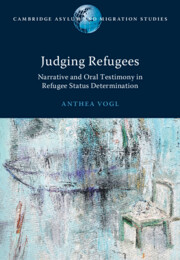Book contents
- Judging Refugees
- Cambridge Asylum and Migration Studies
- Judging Refugees
- Copyright page
- Contents
- Foreword
- Acknowledgements
- Abbreviations
- 1 Introduction
- 2 Law, Literature and Narrative in the RSD Oral Hearing
- 3 How Did We Get Here? A History of the Oral Hearing in Australia and Canada
- 4 The Stock Narrative of Becoming a Refugee
- 5 Narrative Contest as Structuring the Oral Hearing
- 6 ‘I’ll Just Stop You There’: Fragmentation of Refugees’ Oral Testimony
- 7 Beyond the Demand for Narrative: Genres of Refugee Testimony
- 8 Conclusion
- Appendix
- Index
5 - Narrative Contest as Structuring the Oral Hearing
Published online by Cambridge University Press: 15 March 2024
- Judging Refugees
- Cambridge Asylum and Migration Studies
- Judging Refugees
- Copyright page
- Contents
- Foreword
- Acknowledgements
- Abbreviations
- 1 Introduction
- 2 Law, Literature and Narrative in the RSD Oral Hearing
- 3 How Did We Get Here? A History of the Oral Hearing in Australia and Canada
- 4 The Stock Narrative of Becoming a Refugee
- 5 Narrative Contest as Structuring the Oral Hearing
- 6 ‘I’ll Just Stop You There’: Fragmentation of Refugees’ Oral Testimony
- 7 Beyond the Demand for Narrative: Genres of Refugee Testimony
- 8 Conclusion
- Appendix
- Index
Summary
This chapter marks the book’s shift from examining the demand for a particular refugee story during the oral hearing, to considering how decision-makers used narratives to test and contest refugee applicants’ testimony. It presents a key finding from the hearings: that decision-makers often engaged in ‘narrative contests’ with the applicant, presenting their own counter-narratives of how events should have taken place if the story presented were to meet the credibility standard of plausibility. The chapter details how the criterion of ‘plausibility’ forges a direct link between credibility assessment and the narrative form, and also sets out the minimal law or policy that governs the testing of oral evidence during the hearing in Australia and Canada. As a result, decision-makers were relatively free to engage in a form of questioning that went beyond asking refugee applicants for information or explanation. Instead, they presented alternative, hypothetical accounts of how events would have taken place if the story (and by implication, the applicant) were credible. When engaging in these narrative contests, decision-makers’ narrative expectations were often deeply subjective, idiosyncratic and unpredictable. The chapter also reveals that in navigating these exchanges, certain applicants displayed high levels of agency and resistance vis-à-vis decision-makers’ own narrative assumptions and their vast power to direct evidence.
Keywords
- Type
- Chapter
- Information
- Judging RefugeesNarrative and Oral Testimony in Refugee Status Determination, pp. 90 - 112Publisher: Cambridge University PressPrint publication year: 2024

